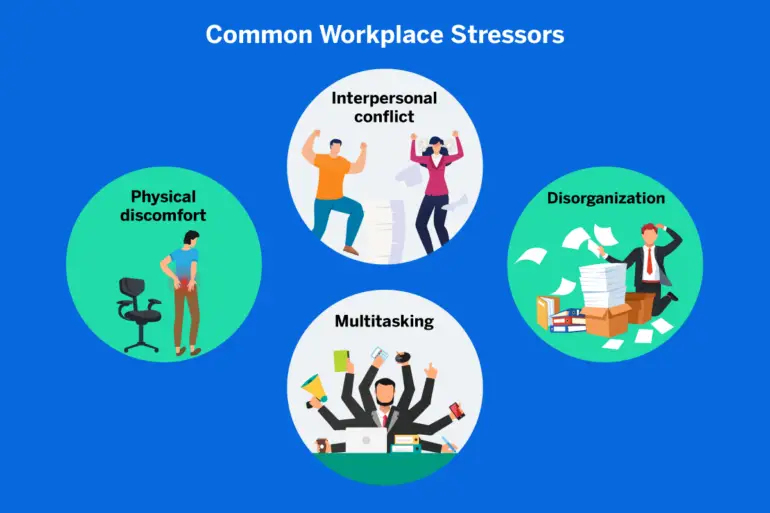Work Stress Management Techniques: How to Thrive in a High-Pressure Environment
In today’s fast-paced work environment, stress has become an inevitable part of the daily grind. Long hours, tight deadlines, demanding bosses, and juggling multiple projects can all take a toll on your mental and physical health. However, managing work stress effectively is crucial not only for your well-being but also for your performance and overall job satisfaction. The good news is that there are numerous techniques to manage work-related stress, improve focus, and maintain a healthy work-life balance.
In this article, we will explore a variety of work stress management techniques that you can implement to reduce anxiety, increase productivity, and boost your mental health. Whether you're feeling overwhelmed by your responsibilities or struggling to maintain a sense of calm in a high-pressure job, these strategies can help you regain control and reduce stress.
1. Identify the Sources of Stress
Before diving into stress management techniques, it's important to understand where your stress is coming from. Identifying the sources of stress at work is the first step toward effectively managing it.
Common Work Stressors Include:
- Heavy workload: Too many tasks or responsibilities can overwhelm you, especially when you’re expected to meet tight deadlines.
- Lack of control: Feeling like you have no say in how your work is done or when it’s done can lead to frustration and stress.
- Poor work-life balance: Being unable to switch off after work or bring your work home with you can leave you feeling burned out.
- Unclear expectations: Ambiguity around job roles, expectations, and performance standards can contribute to anxiety.
- Toxic work culture: A negative or competitive workplace culture, poor relationships with colleagues, or toxic leadership can all increase stress levels.
By pinpointing the specific factors that are causing you stress, you can tailor your approach to managing it more effectively.
2. Prioritize and Organize Tasks
One of the most effective ways to manage work stress is to prioritize your tasks and organize your workflow. Feeling overwhelmed by a long to-do list is a major contributor to stress. Here's how you can stay on top of your tasks:
Time Management Tips:
- Break tasks into smaller chunks: When facing large projects, break them into manageable pieces. This makes them seem less daunting and gives you a sense of accomplishment with each completed task.
- Use a to-do list: Write down all the tasks you need to accomplish. Cross off items as you complete them to maintain a sense of progress.
- Prioritize tasks based on urgency and importance: Use techniques like the Eisenhower Matrix to determine which tasks require immediate attention and which can be deferred or delegated.
- Set realistic goals: Avoid overloading yourself with unrealistic deadlines. It's important to set achievable goals that align with the time and resources available.
By organizing your tasks, you gain a clear roadmap of your day or week. This can reduce stress by preventing confusion, helping you stay focused, and ensuring you’re moving in the right direction.
3. Practice Mindfulness and Meditation
Mindfulness and meditation are two powerful tools that can help reduce stress and improve focus in a work environment. These techniques promote a state of relaxation and awareness, helping you manage your emotions and respond to stressful situations with a clear mind.
How to Practice Mindfulness:
- Take deep breaths: Slow, deep breathing can instantly calm your nervous system and help you regain composure in a stressful situation.
- Mindful moments: Practice mindfulness throughout the day by focusing on the present moment. Whether it’s while answering emails, taking a coffee break, or walking to a meeting, try to stay engaged with your current activity without letting your mind wander to future worries.
- Guided meditation: Use apps like Headspace, Calm, or Insight Timer for guided meditation sessions that can help you unwind and re-center your thoughts.
- Body scan technique: A body scan involves mentally scanning your body for tension, from head to toe. By noticing where you hold stress, you can consciously release it.
Regular mindfulness practices can help you respond to stress in a more balanced way, increasing emotional resilience and improving your overall mental clarity.
4. Set Boundaries and Learn to Say No
At work, you may often feel compelled to say yes to every request, whether it's taking on extra projects or attending every meeting. However, constantly overcommitting can lead to burnout and increased stress. Learning to set boundaries is crucial for maintaining your mental health.
Boundary Setting Tips:
- Learn to say no: It’s okay to say no when taking on additional work will stretch you too thin. Practice assertiveness and explain your current workload if necessary.
- Establish working hours: Set clear work hours and stick to them. Avoid checking emails or doing work outside of these hours to protect your personal time.
- Delegate when possible: If you're overwhelmed, delegate tasks to colleagues or team members who have the capacity to help.
- Take regular breaks: Avoid working for long stretches without breaks. Schedule short breaks throughout the day to rest and recharge.
Setting clear boundaries will help you avoid feeling overwhelmed and allow you to focus on your most important tasks.
5. Maintain a Healthy Lifestyle
Your physical health has a direct impact on your ability to manage stress. When your body is physically healthy, you are more resilient to stress and can think more clearly. A healthy lifestyle isn’t just about hitting the gym—it’s about taking care of your body and mind as a whole.
Healthy Lifestyle Tips:
- Exercise regularly: Physical activity is a proven stress reliever. It helps release endorphins, which are natural mood boosters. Aim for at least 30 minutes of exercise a few times a week—whether it's a walk, a run, yoga, or strength training.
- Get enough sleep: Lack of sleep can worsen stress and impair cognitive function. Aim for 7-9 hours of quality sleep each night to support mental clarity and emotional balance.
- Eat a balanced diet: Nutrition plays a key role in your ability to manage stress. A healthy, balanced diet with plenty of fruits, vegetables, lean proteins, and healthy fats can help stabilize your mood and energy levels.
- Stay hydrated: Dehydration can lead to irritability, fatigue, and decreased focus. Drink plenty of water throughout the day to stay energized and alert.
Taking care of your body is one of the most effective ways to improve your resilience to work stress.
6. Improve Your Work Environment
Your physical workspace can also influence your stress levels. A cluttered or disorganized workspace can increase feelings of chaos and make it difficult to focus. Creating a calm, organized, and efficient work environment can significantly reduce work-related stress.
Tips for a Stress-Free Workspace:
- Declutter your desk: Keep only the essentials on your desk. A clean and organized workspace will help you feel more in control.
- Personalize your space: Adding personal touches, such as photos, plants, or inspirational quotes, can create a more welcoming and calming atmosphere.
- Optimize ergonomics: Ensure your desk, chair, and computer setup are ergonomically designed to prevent physical discomfort. Poor posture can lead to tension and stress.
- Reduce distractions: Minimize distractions by turning off non-essential notifications, organizing your files, and creating a quiet, focused work zone.
A well-organized and calm workspace can enhance productivity and reduce unnecessary stressors during the workday.
7. Seek Social Support
Social support plays a vital role in stress management. Talking to someone you trust about your work stress can provide emotional relief, offer new perspectives, and help you feel understood.
Ways to Seek Support:
- Talk to a coworker or manager: Having open conversations with colleagues or supervisors about your workload or stressors can provide support and sometimes lead to practical solutions.
- Seek mentorship: Having a mentor at work who can provide advice, guidance, and encouragement can help you navigate stressful situations and boost your confidence.
- Support groups: Many companies offer employee assistance programs (EAPs) that provide counseling or peer support groups for managing work stress. Take advantage of these services if available.
Knowing that you have a support network can help you manage stress more effectively and provide comfort during challenging times.
8. Practice Self-Care and Relaxation Techniques
Taking time to unwind and relax is essential for maintaining mental health. Incorporating regular self-care practices into your routine can help you recharge and stay balanced.
Relaxation Techniques:
- Deep breathing exercises: Focus on deep, slow breathing to activate your body's relaxation response. Techniques like box breathing (inhale for 4 seconds, hold for 4 seconds, exhale for 4 seconds) can help calm the nervous system.
- Progressive muscle relaxation: Tense and then slowly relax each muscle group in your body to release physical tension and stress.
- Aromatherapy: Essential oils like lavender, chamomile, and eucalyptus can promote relaxation and reduce anxiety. Use a diffuser at your desk or apply a few drops to your wrists.
By making time for regular relaxation, you can restore your energy and manage stress more effectively.
Work stress is an inevitable part of modern professional life, but it doesn’t have to take a toll on your health or performance. By implementing the right stress management techniques—such as identifying stressors, practicing mindfulness, prioritizing tasks, setting boundaries, maintaining a healthy lifestyle, and seeking social support—you can gain better control over your stress and improve your overall well-being. Remember, stress is not something to be ignored, but something that can be managed with the right tools and mindset. By taking proactive steps to manage stress, you can thrive in even the most demanding work environments.





